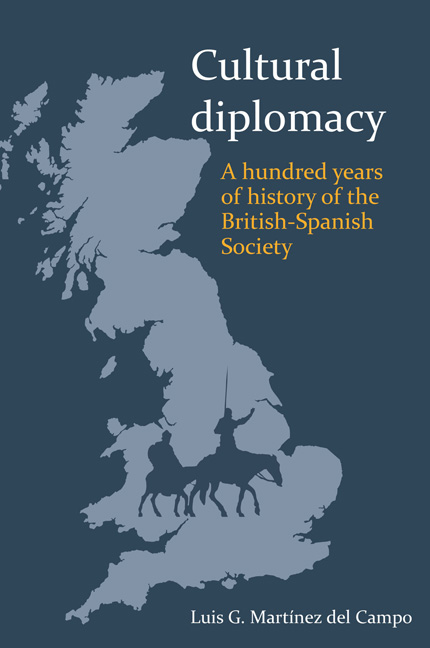Book contents
- Frontmatter
- Contents
- Joint Foreword
- Prologue
- English Edition
- Acknowledgements
- 1 Introduction
- 2 The foundation and expansion of the Anglo-Spanish Society (1916–1920)
- 3 The Anglo-Spanish Society in the interwar period
- 4 The rebirth: The League of Friendship (1950–1958)
- 5 A return to the origins: The new Anglo-Spanish Society
- 6 The Anglo-Spanish Society and Spanish democracy
- 7 Epilogue
- 8 Appendix: Memories of a retired member of the Executive Council of the Society by John Scanlan
- VERSIÓN EN ESPAÑOL
- Nota del autor
- 1 Introducción
- 2 Nacimiento y expansión de la Anglo-Spanish Society (1916–1920)
- 3 La Anglo-Spanish Society en el periodo de entreguerras
- 4 La reorganización: La Liga de la Amistad (1950–1958)
- 5 De vuelta a su origen: La nueva Anglo-Spanish Society
- 6 La Anglo-Spanish Society y la democracia
- 7 Epílogo
- 8 Apéndice: Cuadro de Cargos
- Index – English
- Index – Spanish
5 - A return to the origins: The new Anglo-Spanish Society
- Frontmatter
- Contents
- Joint Foreword
- Prologue
- English Edition
- Acknowledgements
- 1 Introduction
- 2 The foundation and expansion of the Anglo-Spanish Society (1916–1920)
- 3 The Anglo-Spanish Society in the interwar period
- 4 The rebirth: The League of Friendship (1950–1958)
- 5 A return to the origins: The new Anglo-Spanish Society
- 6 The Anglo-Spanish Society and Spanish democracy
- 7 Epilogue
- 8 Appendix: Memories of a retired member of the Executive Council of the Society by John Scanlan
- VERSIÓN EN ESPAÑOL
- Nota del autor
- 1 Introducción
- 2 Nacimiento y expansión de la Anglo-Spanish Society (1916–1920)
- 3 La Anglo-Spanish Society en el periodo de entreguerras
- 4 La reorganización: La Liga de la Amistad (1950–1958)
- 5 De vuelta a su origen: La nueva Anglo-Spanish Society
- 6 La Anglo-Spanish Society y la democracia
- 7 Epílogo
- 8 Apéndice: Cuadro de Cargos
- Index – English
- Index – Spanish
Summary
The changes within the Spanish Embassy in London and the League of Friendship marked the beginning of a new stage in the Society's history. The new Chairman, John Balfour, planned a reorganisation of the institution to restore its original principles, ensure financial stability and limit its mission to cultural and educational events.
He convened a general meeting of the League at the Challoner Club on 28 May 1958. Edward Palmer presided over the meeting, because Balfour was abroad. During the session, some important agreements were reached. The first was to increase all membership fees. Although £1,220 were being raised in the Ball of 1957, the high cost of The Quarterly Journal (which was given a new name: The Quarterly Review) meant that this increase was necessary. The second step was the election of the members of the Executive Committee, which included experienced leaders and new faces. The final measure introduced changes to the constitution of the League, which was renamed as The Anglo-Spanish Society. In this way, the old name was recovered, but the phrase which had followed it before (“of the British Empire and Spanish-speaking countries”) was removed, erasing any reference to Spanish-America.111
This general meeting guaranteed the continuity of the association and drew up the plan for a new period. The society rejected ideological bias and focused on promoting Spanish language and culture in the UK through lectures and events. The Quarterly Review demonstrated these changes by paying more attention to cultural topics. The editor asked some prestigious British hispanists for contributions, like Professor Alexander Augustine Parker, who sent an article to be published in the journal. The association also strengthened collaborations with other bilateral institutions such as the Anglo-Catalan Society, which was founded in 1954 and had an important educational mission.112
In just two years, the Executive Committee of the Anglo-Spanish Society strengthened the association, leaving its previous instability behind. After the institution had been reshaped, John Balfour resigned, and in 1959, was succeeded as Chairman by Rowland Denys Guy Winn, an aristocrat who was known as Lord St Oswald.
- Type
- Chapter
- Information
- Cultural DiplomacyA Hundred Years of the British-Spanish Society, pp. 63 - 71Publisher: Liverpool University PressPrint publication year: 2015



